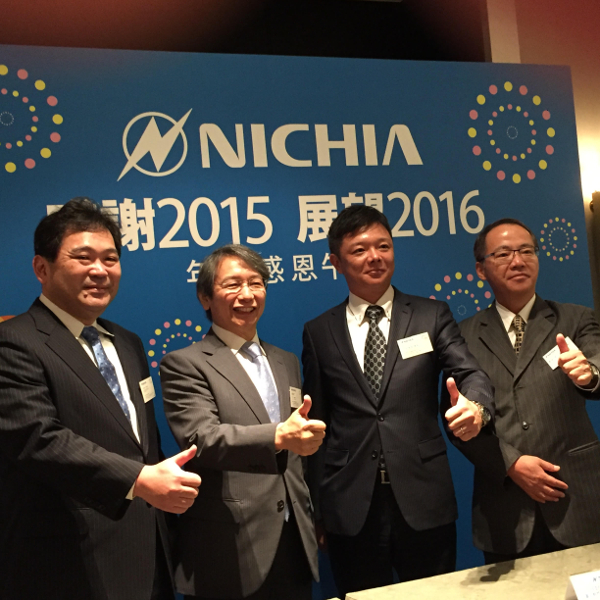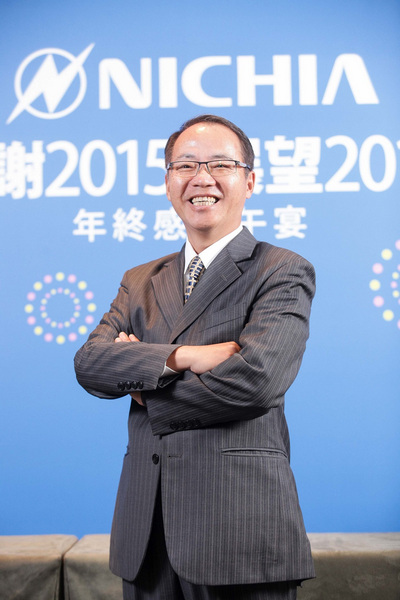The sluggish global economy triggered the downtrend in the LED industry in 2015, and next year is expected to be just as challenging for manufacturers in the backlight and general lighting market, said Katsuyuki Akutagawa, Chief Legal & IP Officer and Company Board Director of Nichia (the company) at a press conference held in Mandarin Oriental Taipei, earlier Wednesday.
Even though the market will become increasingly challenging, the top global LED chip maker projected the market would still grow at a moderate pace of about 5% in 2016.
For manufacturers to survive the oncoming “winter” in the industry, Akutagawa advised LED manufacturers including SMEs to invest in R&D and spend time developing advanced lighting technology. “Advancements in LED package technology compared to the past, will make it increasingly difficult for me-too manufacturers to last in the industry,” he added.
Industry mergers and acquisitions are also projected to intensify next year, said Akutagawa. “Only SMEs with technology advantages in niche market lighting applications will be acquired by large manufacturers,” he said. The Japanese company, though, has no intention of acquiring any companies for the time being.
 |
|
Left to right: Hinori Takagi, General Manager, Intellecutal Property Department, Legal and Intellectual Property Dept., Legal & Intellectual property Division Administration Unit, Nichia, Katsuyuki Akutagawa, Chief Legal & IP Officer and Company Board Director of Nichia, Takashi Sakamoto, Principal Technical Officer, Optoelectronics Products The BU, Nichia, Hiroshi Watanabe, Spokesman for Nichia in Taiwan. (LEDinside) |
Estimates of Nichia R&D investment budget for 2016
Instead of absorbing competitors, Nichia plans to focus on what it does best: LED chip R&D. The company’s intended R&D investment for next year will be even higher than this year, said Hinori Takagi, General Manager, Intellecutal Property Department, Legal and Intellectual Property Dept., Legal & Intellectual property Division Administration Unit of the company, who declined to give exact figures.
To give a rough idea of what this amount might be, at an earlier press conference in Taipei during March, 2015, the Japanese company stated its R&D budget ranged between 30 billion to 40 billion Japanese Yen (US $ 250 million-330 million) this year, so the R&D budget will be at least higher than the previous budget figure.
According to Nichia officials, the company’s 2015 equipment investments was double the amount of 2014, and has maintained a two digit operation gross margin.
 |
|
Nichia's newly appointed spokesman to Taiwan, Mr. Hiroshi Watanabe. (Photo courtesy of Nichia) |
Company to introduce DMC flip chips to backlight products
In March 2015, Nichia announced it would be mass producing, Elemental LEDs (ELEDS), a flip chip LED one-ninth the size of same type of chips at the time by the end of the year. Company executives has since renamed the 1 millimeter square (mm2) flip chip LED to Direct Mountable Chip (DMC) to reflect its properties of direct mounting to a sapphire substrate, with no additional packaging required.
The 2W DMC flip chips that have a brightness range of 120 lm/W to 150 lm/W were mass produced in October this year, are already being applied in lighting applications, said Takashi Sakamoto, Principal Technical Officer, Optoelectronics Products The BU, Nichia. “Our goal for 2016 is to introduce this flip chip product to LCD display (backlight products).”
Nichia looks into niche markets covering UV LED, automotive lighting, and laser
The Japanese company delivered a solid performance despite the economic downturn this year, mainly due to its niche market strategies. Nichia reported its automotive LED product grew 20% this year, and now consists 30% of the company revenue, while general lighting applications have a revenue share of about 20%, said Akutagawa.
For 2016, Nichia plans to tap into the market potential of niche UV LED market for exposurers by next year, with the objective to enter UVC market for water sanitation applications, said Sakamoto. UVC products remain expensive to manufacture, and it might take some time before prices fall to a reasonable range for mass production, noted Takagi. UV LEDs still consist a very small revenue share in Nichia’s total earnings.
Laser is also a field where the Japanese company with a traditional stronghold is looking into. The company has ruled out laser headlights for the time being, due to high financing requirements for automotive lighting R&D, and long period involved in the lights safety certification, said Sakamoto. The company is currently eyeing the projector market, where projection light sources will all be retrofitted with lasers, said Takagi.
No intention to settle lawsuit with Everlight soon
Lastly, Nichia and Everlight’s raging patent war in German and American courts will probably not be settled anytime soon. “If our competitor is trustworthy and reliable, we are more than willing to settle the lawsuit,” responded Akutagawa to journalist inquiries about its ongoing patent lawsuits against Everlight subsidiary WOFI in Germany and U.S. courts.
The company prefers to take a no mercy stance against patent trolls, but thinks it is best to settle patent wars with other manufacturers soon, said Akutagawa.
At the press conference, Nichia also introduced their new spokesperson based in Taiwan, Mr. Hiroshi Watanabe.
(Author: Judy Lin, Chief Editor, LEDinside)













